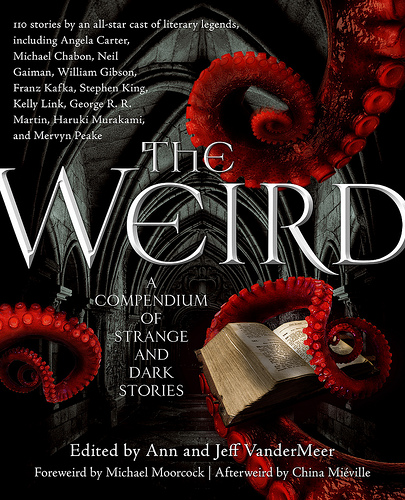November 24th, 2012 § § permalink
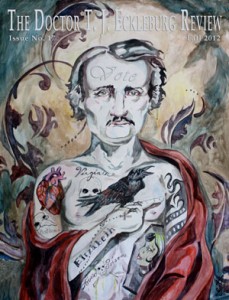
Poe in Goth Ink by Lex
Editor Rae Bryant of The Dr. T.J. Eckleburg Review announced her magazine’s pick-six nominations: the pieces, from among all those published, that will be forwarded for consideration to this year’s Pushcart Prizes. Here they are:
Fiction
Excerpt from His Wife Leaves Him by Stephen Dixon
“You’re an Ugly Crier†by Megan Giddings
“The Nonsense Singers of the Red Forest†by Rick Moody
Nonfiction
Excerpt from Something Wrong with Her: A Hybrid Memoir by Cris Mazza
Poetry
“Portrait d’Erik Satie†by Moira Egan
Translation
“The Women Who Watch†trans. by Edward Gauvin
I’m terribly flattered to be nominated–my first!–from all the amazing work that has appeared in the magazine this year. Congrats to all nominees, and best of luck for the next round! What amazing company for Thomas Owen to be in! How often would you see him in a context with Dixon and Moody? Owen is a towering figure in Belgian supernatural fiction, and I hope the story will lead readers to seek out more of his work. His fans have reason to rejoice this season, since the most excellent indie British publisher Tartarus Press, fresh off their third World Fantasy Award, is bringing the only English volume of Owen’s short stories back into print. In 1984, William Kimber published The Desolate Presence, an anthology elected from six collections and several decades of work by Iain White, to whom we owe translations of other pioneering fabulists like Jean Ray and Marcel Schwob. The book has since become a collector’s item, the few circulating copies commanding steep prices. Tartarus is reprinting White’s selection with seven newly translated stories, retitled as The House of Oracles. The volume will bear all the hallmarks of Tartarus’ loving production: sewn hardcover binding, silk ribbons, and original art.
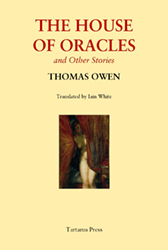
Fans looking for other free work by Owen online should check out my translation of “Kavar the Rat†at Weird Fiction Review. Or, longing for a fine audio versions of both these tales? Check out “Kavar†read by David Rees-Thomas and “The Women Who Watch†read by Pete Milan at the horror podcast Pseudopod.
The Dr. T.J. Eckleburg Review is the reincarnation, under the aegis of Johns Hopkins, of The Moon Milk Review, but its change in title inspiration from Calvino to Fitzgerald in no way construes a lesser commitment to fabulism, of which Rae Bryant offers a spirited defense on the occasion of Mo Yan’s Nobel Prize.
Eckleburg, whose first two issues featured Belgians Thomas Owen and André-Marcel Adamek, is one of two revues in whose recent launches I’ve been lucky enough to participate, the other being The Coffin Factory, whose first three issues featured Bernard Quiriny (also in Subtropics, World Literature Today, and Best European Fiction), Maurice Pons (also in Tin House), and Jean Ferry (whose collection The Conductor is forthcoming). Eckleburg is gearing up for its third issue (#18) next year, and the leap from online to print.
Congrats again to the nominees, and a huge thanks to all involved!
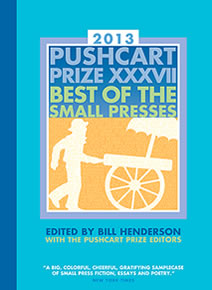
November 18th, 2012 § § permalink

The coming year should bring more Châteaureynaud to his American fans—newly translated stories in at least two anthologies—and I should finally be finishing the novel follow-up to the 2010 story collection. Meanwhile, in a review at that clearinghouse of all translated lit, Three Percent, Catherine Bailey has these kind words for A Life on Paper:
Like those master storytellers whose haunting tales were exaggerated by the play of their hands over the flame, Châteaureynaud makes expert thematic use of both light and shadow to reveal his fantastical realms of wonder and fear. His unassuming prose startles as it entrances, holding readers on the edge of elegantly rendered, fantastical dream-worlds while all at once alluding to their more nightmarish qualities. In the style of Kafka and Poe, Châteaureynaud makes the supernatural seem not only present, but ubiquitous, inclined to encroach at any moment on the humdrum lives of unsuspecting mortals. More sinister than fairy tales, yet not quite definable as horror stories, Châteaureynaud’s whimsical writings leave one unsettled and alert, appreciating anew the possibilities of the chilly night air while simultaneously feeling the urge to draw nearer to the fire—just in case…
The border between fantasy and obsession in these stories is never fixed, and some of the humans in Châteaureynaud’s fiction rival his ghosts, goblins, and spooks in their ability to make a reader shiver.
Perhaps it is for that reason that some of the most successful stories in this collection—a sampling chosen from other 30 years of Châteaureynaud’s work—focus not on the mysteries of the supernatural, which the author never seeks to rationalize, but on the intricacies of his human subjects. Whether taken metaphorically or literally, the vignettes in which mystical interludes catalyze or coincide with poignant emotional development in lead protagonists are some of Châteaureynaud’s richest and most memorable.
In case you missed it, Levi Stahl offers up a trenchant appreciation of Châteaureynaud’s short-short “A Citizen Speaks,†which opens the collection.
It’s a lesson in concision, in the way that allowing a voice to speak to the reader as if we already share a substantial amount of underlying knowledge of his world can allow a writer to cut right to the uncanny details of that world; the flat, matter-of-fact tone that results only emphasizes the strangeness of the situation being revealed. Dread edging into horror in two pages—that’s an achievement.
I’d love to hear his take on the rest of the book.
November 14th, 2012 § § permalink
From Pamela Paul’s review of Zeina Abirached’s A Game for Swallows:
Less a story than a portrait of a family and a city and a culture under siege, the narrative unfolds somewhat disjointedly, intentionally perhaps — as a means of conveying the haphazard and precarious nature of life in a city beset by civil war…
…the afternoon of waiting for the parents’ return remains grimly tense (a scene in which the family and neighbors call out “Incoming!†and “Outgoing!†in response to the explosions outside is terrifyingly real, with the characters faces falling slack during moments of silence and panicked when the bombs explode). The profound dislocation of living in a war zone is palpable on every page. And an ominous question hangs over it all: Will Abirached’s parents return? And if they do, what exactly will they be returning to?
The book’s strengths are myriad. Abirached is a lovely artist, and her characters’ faces are remarkably expressive. There is much humor, a welcome relief from the chaos and heartache of the human stories within.
For young readers, “A Game for Swallows†will come as a revelation. At a time when the Middle East is still in turmoil and when Americans have suffered losses of electricity and other necessities during recent storms and floods, this is a story that will hit home even as it causes young, impressionable eyes to look at life abroad.
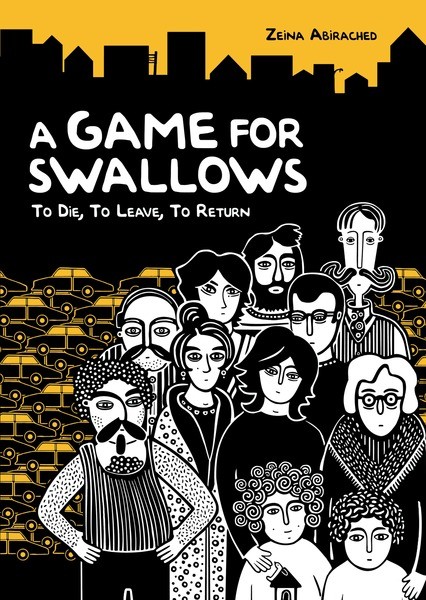
November 12th, 2012 § § permalink
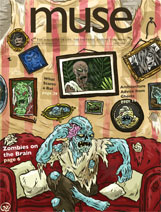
We’re almost midway through the next month already, but in case you missed it, there’s still time to pick up last month’s MUSE — “The Magazine Life, the Universe, and Pie Throwing” — for the kid in your life (or in you). MUSE is the ages 10-and-up member of the venerable Carus periodical family that includes such childhood favorites as Cricket and Cicada. The October, zombie-themed issue of MUSE features a brief excerpt from Billy Fog, featuring Lea the Ghost:
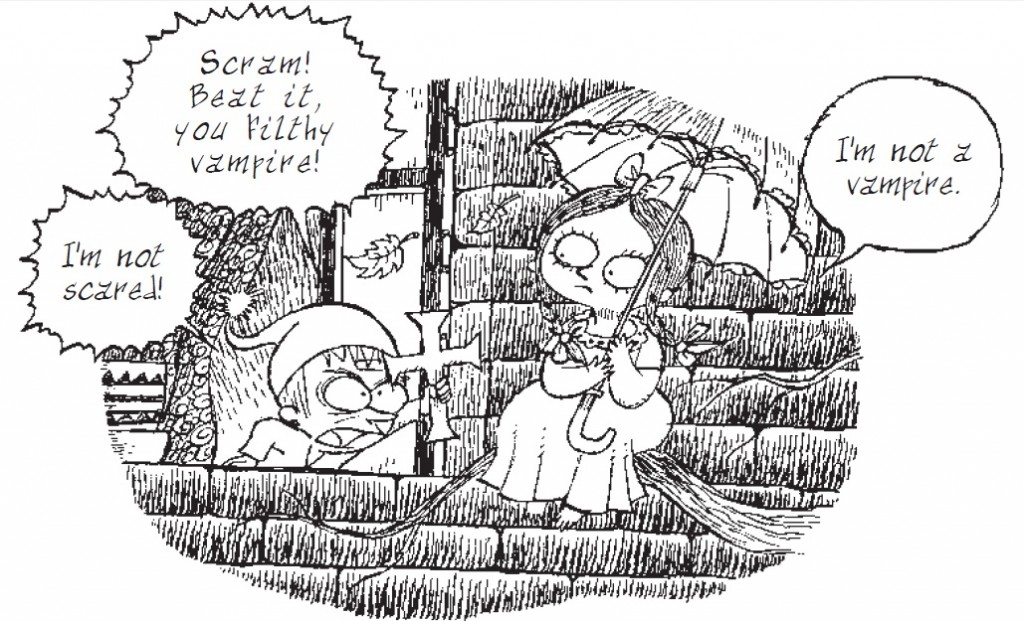
I’ve been touting this graphic novel ever since I first translated it. It came out last January, and would make for a great Christmas gift, hint hint… I think of it as Edward Gorey meets Calvin & Hobbes. The death of Billy’s beloved pet cat Tarzan sends him on a quest to “find out the secret of death.” He’s convinced that if anyone knows, it must be Santa, since he’s been around so long, and writes him a letter demanding the secret for Christmas. There’s a nice balance of the gruesome and the cheery. Author Guillaume Bianco tells this story not only through traditional comics pages with panels and speech balloons, but regular excerpts from a Quibbler-type “Gazette of the Bizarre,” macabre Shel- Silverstein-type poems, and entries from Billy’s own imagined bestiary (which includes ghosts, boogeymen, monstrous insects, and even kid sisters). It’s a tremendous feat of world-building, not only graphically but verbally inventive -— Bianco’s knack for wicked ostentation and morbid understatement come through not only in his pictures but his words. Slugs and snails and puppy dogs’ tails —- these are all present, along with princesses that sprout from squmkins, super-hoodies, vegetarian vampiresses, murderous moppets, Maupassant, Ouija boards, and seamstresses who put their eyes out with scissors.
November 4th, 2012 § § permalink

Congratulations to all this year’s World Fantasy Award Winners, just announced today, especially
- Ann & Jeff VanderMeer in the Best Anthology Category for The Weird
- Raymond Russell & Rosalie Parker, in the Special Award—Non-professional category for running Tartarus Press
- Eric Lane, in the Special Award—Professional category for publishing in translation – Dedalus Books. Yay translation!
Congratulations as well to Ann & Jeff VanderMeer‘s The Weird for taking the British Fantasy Award for Best Anthology earlier last month! I’m proud to be part of their crackerjack team at Weird Fiction Review! (I made a new category for it in the sidebar. Also, Part II of my piece on genrebending and The Last Days of An Immortal goes up there tomorrow! Check it out!)
